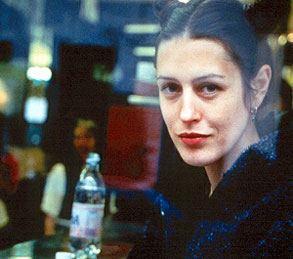Michael Winterbottom’s “Wonderland,” a family drama that takes place in South London over one weekend, harbors a cast of characters whose interlocking problems should surely move us: a lonely cafe waitress, whose personal ad attracts a string of undesirables; her pregnant sister, whose live-in boyfriend suddenly quits his job, jeopardizing the little family’s well-being; their mother and father, whose marriage has disintegrated into the kind of petty bickering that signifies not affection but a brittle glaze of hostility and alienation.
These are people whose pain is so obviously acute (portrayed by actors who in some cases give very fine performances) that we should be swept into their orbit of melancholy without even thinking about it. The problem is that “Wonderland” is so aggressively depressing, up to and including its ruefully upbeat ending, that it’s less affecting than it should be. Its misery is worked out in so much filigree that you’re more aware of the story’s contrivances than you are of the individuals’ suffering. Its relentless desperation works on us like a stupefying narcotic.
The movie opens with Nadia (Gina McKee) being chatted up by an awkward and unlikely dating candidate in a noisy bar; it’s a promising scene, capturing perfectly the awkwardness between the sexes that seems to flourish so extravagantly in loud, smoky places. Nadia’s loneliness (and her heartbreakingly undaunted hopefulness) might have worked well as the centerpiece of the movie, but instead Winterbottom and screenwriter Laurence Coriat bank a host of other misfortunes around it, clearly going for the snowball effect.
Over the course of the weekend, Nadia’s very pregnant sister Molly (Molly Parker) suddenly faces irreconcilable alienation from her well-meaning but hapless boyfriend Eddie (John Simm). A third sister, Debbie (Shirley Henderson), a sexually rambunctious hairdresser estranged from her big-time loser husband, Dan (Ian Hart), and raising her son alone, practically loses the boy through a series of mishaps. We see the sisters’ parents (Kika Markham, who plays her wretchedness like one monotonous note, and Jack Shepherd, who manages to make his hangdog ineffectualness moving instead of stultifying) mired in their own unhappiness, living in one of those modest English homes that are decorated so cheerfully that they practically scream desperation.
The task of excavating these characters’ innate sadness would have been plenty for Winterbottom to take on. But so many horrible things happen in “Wonderland” that you begin to feel manipulated to the point of numbness. One character is brutally mugged. Another gets into a nearly fatal roadway accident. A third commits an act of outright cruelty against an animal, and we’re supposed to simply accept it as a signal of that character’s deeply depressive state. (There’s one moment where we see a flicker of emotion cross the perpetrator’s face, but it’s not clearly readable as regret — it looks like simple blankness — and the movie never shows us whether the character comes to terms with the horribleness of the act.)
And in case we’re not able to grasp the significance of these characters’ trials, every time they face confusion or difficulty we get sweeping orchestral swells or mournful piano melodies (from a score by Michael Nyman) that are supposed to represent, alternately, the indomitability of the human spirit or the tragic hopelessness of the pursuit of happiness. Some marginally interesting “Koyaanisqatsi”-like nighttime street scene shots aside, the London of “Wonderland” looks like one of the ugliest and most dismal cities in the world.
The point is, of course, that that’s how it looks to these characters. (And, obviously, none of them can afford to live in the swankier, prettier neighborhoods.) But Sean Bobbit’s cinematography makes the city look flat and one-dimensional, and we’re always aware that a point’s being made with the movie’s visuals. When Eddie rings his wife from a pay phone with a possible baby name (it’s “Alice” — get it?), we’re treated to lingering shots of the lewd sex ads that pepper the inside of the phone box.
“Wonderland” is so leaden, it’s hard to believe it came from the same director who gave us the genuinely piercing, if at times slightly overwrought, “Welcome to Sarajevo.” By the end of “Wonderland,” I might have felt completely pistol-whipped if not for the gracefulness of some of the movie’s actors. Debbie’s lackadaisical and dangerously careless estranged husband is one of the movie’s most unsympathetic characters, but as played by Hart, we can’t help feeling a little sorry for him. He’s one of those scruffy average Joes whose affability seems to be wrapped up in their cluelessness. Parker (who was phenomenal as a tender and sensuous necrophiliac in the 1996 Canadian film “Kissed”) vests the character of Molly with a dewy innocence that has a certain toughness at its core. With her swollen belly and pale, freckled skin, she’s a perfect picture of the soft, loving side of motherhood. When she turns on her husband, her cool glare betrays a protectiveness that’s almost feral.
And as Nadia, McKee (who gave the most memorable performance, as Hugh Grant’s wheelchair-bound ex-girlfriend, in the otherwise dreadful “Notting Hill”) is a marvel. Her face is so open and so guarded at the same time — without ever being inscrutable — that we see directly into Nadia’s sadness without any smoke-and-mirrors distractions. With her hair twisted up into two moon maiden nublets atop her head, and her gangly walk, she looks like a little girl who refuses to grow up. But there’s also something refreshingly mature and grounded about her. Even with her slightly downturned mouth and tired circles under her eyes, she throws off a steady low-wattage effervescence, like a weary firefly that defiantly insists on lighting up. McKee’s Nadia is an unerring guide through the calculatedly disheartening events that make up “Wonderland.” Even when the movie takes its myriad wrong turns, we never get lost by following her.


